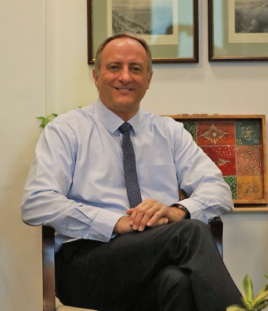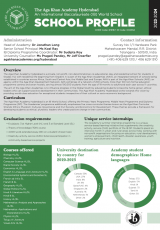Dr Jonathan Long who has joined as the Head of Academy in Hyderabad believes that the role of a school leader should be seen as a custodian of ethos and atmosphere and that this can help transform education into meaningful life lessons.
Please tell us a little about yourself and your family. I grew up in Africa – Ghana, Zambia and South Africa. My wife, Sue, and I have two daughters – Zoe and Alice. Zoe lives in California and Alice lives in Wales. We have a granddaughter, Molly.
You have headed some prominent academies around the world including few in India. We’d love to learn about your previous experiences in education.
I have spent nearly eight years in Switzerland as Principal of a leading international school which brought together young minds from diverse backgrounds and over 75 nationalities to live and learn together in a uniquely challenging international community.
In 2008, I was appointed as Principal of the United World College of India in Pune. The UWC movement brought together students from all over the world – selected on personal merit, irrespective of race, religion, politics or the ability to pay – with the explicit aim of fostering peace and international understanding.
In 2011, I became Principal of Woodstock School in Mussoorie. Woodstock is one of India oldest schools with a worldwide reputation for developing academic and leadership potential of young individuals from diverse cultural and socio-economic backgrounds.
What made you choose education as a profession? Was it a calling or a love?
Well, quite honestly, I stumbled into education – more by chance than design. If anyone had told me as a student that one day I would be a teacher and school Principal, I would have dismissed them as mad! But soon after taking on a job as a teacher to pay my university fees, I began to realise the enormous significance of education in the modern world. As Nelson Mandela put it, “Education is the greatest weapon we can use to change the world.”
Why did you choose to work with the Aga Khan Academy Hyderabad?
To put it simply, the vision of His Highness the Aga Khan inspires me; the potential of the Academy excites me and the challenges here energises me!
Could you please elaborate on your role and what goals you envision to achieve during your time here as the Head of Academy?
The words of the famous Scottish historian and novelist, John Buchan, inspires my philosophy as a school leader: "Our task in leadership is not to put the greatness back into humanity - but to elicit it - for the greatness is there already."
I believe that leadership is about eliciting the greatness is those around us, making others outstanding and in releasing a community’s potential for innovation, self-confidence and creative energy. By keeping the “technical” aspects of leadership aside, I see the school leaders, pre-eminently, as the custodian of ethos and atmosphere – for it is these qualities which leaves a profound impact on the development of students and staff alike.
What according to you are the key elements for a good student-teacher relationship?
I personally feel that this is found in the compelling power of openness, integrity, honesty and the transformation that comes from relating to others as ‘persons’. As the German writer and thinker Goethe puts it, “we only truly learn from those we love.” This finds practical expression in a warm, supportive and a friendly environment – one, characterized by civility, respect and attentive listening. It will be one in which capricious discipline, insult and bullying are absent. Gentleness, kindness and a willingness to be vulnerable are the most reliable qualities any teacher can bring with them to their vocation – and these can only be expected from the strong. Only within this kind of environment can the greater educational goals of the Academy be achieved.
What inspires you to excel as an individual? Do you have any role model or a favourite quote that you hold onto dearly?
I once read an article about the top CEOs in the world, and what they wish they had been told before they started out in their careers. One point that came up was the difference between management and leadership. “Managers do things right, while leaders do the right things.”
The second thing is knowing when to do something and when to do nothing. Because sometimes stepping back and reflecting on matters in-hand can actually be the best course of action!
The final insight was the fact that it is easy to value what we measure but much harder to measure what we really value. Knowing what is really worth measuring is one of the hardest things to be clear about in education.
Dr Long, please tell us what according to you constitutes a successful and an enriching learning environment?
An enriching learning environment is challenging, engaging and experiential. All that we now know about the learning process tells us that the teacher should be the facilitator and not the performer. It is all about seeking the teachable moment, offering enough challenge for young people to be drawn out of their individual comfort zones into the realm of self-directed discovery and insight. To achieve this, the spaces we create (literally and figuratively) must be safe and capable of eliciting the learners’ potential – enabling energy and opportunity to combine in pursuit of possibility. The best schools help young people recognise that there is more in them than they think!
What do you do in your spare time? Do you have any hobbies you like doing?
I have many passions and hobbies. It’s good to be living in India where so many people share my love of motorcycles, I have restored a 1968 Jawa and enjoy working on engines. I have travelled by motorcycle to Ladakh, Spiti Valley and Bhutan. I also hold a pilot’s licence. I enjoy fitness training and have completed three Ironman triathlons in the past.
In terms of education, my great passion is to help young individuals discover their grand and innate passion in life, which can often lie undiscovered.
Wow, that is so amazing! Is there anything (interesting or funny) about yourself that you would want the students to know?
Haha – there may be a few things – but that’s something for them to find out for themselves!
Finally, what excites you about being in the city of Hyderabad? Have you been able to visit any local places yet?
To be honest, I am not a great fan of cities! I love the beauty of nature and I appreciate quiet and gentle places. Educational research tells us that the physical environment influences the education which happens there. I have no doubt that an education which takes place in an urban setting is very different to that which takes places amidst the beauty of nature. Who can then doubt that an education which takes place on this magnificent campus spread across 100 acres is significantly different from that which takes place amidst the hub of traffic and high rise buildings?
Speaking about discovering Hyderabad, I will definitely look forward to discovering its culture, its history and its people. I have heard a lot about Hyderabadi food – especially some great sweets and desserts!
By Ekta Bhatia






